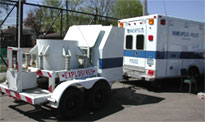 In 2018, the Minnesota legislature took a huge step, and passed legislation creating a workers’ compensation statutory presumption of PTSD for our state’s first responders. In other words, for certain workers in the state of Minnesota, including police officers, firefighters, corrections officers, and others defined as “first responders,” a diagnosis of post-traumatic stress disorder is to be presumed to be work-related. The goal of this bill, authorized by Representative Nick Zerwas (R), and which had almost unanimous support in the legislature, was to eliminate barriers to quick, effective medical care for our State’s first responders suffering from PTSD.
In 2018, the Minnesota legislature took a huge step, and passed legislation creating a workers’ compensation statutory presumption of PTSD for our state’s first responders. In other words, for certain workers in the state of Minnesota, including police officers, firefighters, corrections officers, and others defined as “first responders,” a diagnosis of post-traumatic stress disorder is to be presumed to be work-related. The goal of this bill, authorized by Representative Nick Zerwas (R), and which had almost unanimous support in the legislature, was to eliminate barriers to quick, effective medical care for our State’s first responders suffering from PTSD.
The presumption statute was largely in response to the way our first responders’ claims were being handled by public insurers – which was to deny, deny, deny. The hope was that Representative Zerwas’ presumption bill might change that. But, in order to get business interests on board, the bill also directs the Department of Labor and Industry to create “treatment parameters,” which are a set of administrative rules governing what kind of treatment is authorized, how often that treatment is authorized, and how long that treatment is authorized, amongst other things. The Department has gone through several drafts of these rules and unfortunately, numerous Plaintiff’s attorneys, including the attorneys at Meuser Law, are gravely concerned that the rules that are ultimately developed may very well make it even harder for our state’s first responder to access appropriate care.
At the invitation of Law Enforcement Labor Services (LELS) and the Minnesota Police and Peace Officers Association (MPPOA), I attended a meeting with Representative Nick Zerwas, LELS, MPPOA, Department of Labor and Industry Commissioner Ken Peterson and others, which took place on November 1, 2018. At that meeting, we made our concerns abundantly clear regarding the draft treatment parameters.
Since that time, various revisions have occurred to the parameters, but after reviewing the latest version found here, it’s obvious that the drafters of the parameters did not take our input seriously. While they made a few changes to the parameters, the most troublesome issues are still in the rules. Our office will continue to do what we can to stop these parameters from taking effect, but our options are somewhat limited. The rules are set to take effect July 1, 2019. Frankly, for the health and safety of our first responder clients, we are considering recommending that they proceed outside the workers’ compensation system so as to avoid these completely arbitrary rules and limitations on treatment until they’ve had an opportunity to treat until their symptoms are better controlled – and then proceeding with a workers’ compensation claim later on. That obviously completely undermines the purpose of the presumption statute, but as it stands – the proposed parameters also completely undermine the purpose of the statute.
Here are some of the biggest issues with the current draft of the proposed PTSD parameters:
- The 16-week limitation – An individual who has an admitted workers’ compensation claim for PTSD gets no more than 16 weeks of treatment – of one particular modality – at a frequency no greater than twice a week. Where does the 16 weeks come from? No one seems to know or be willing to acknowledge the rationale behind a 16-week limitation. What I can say is that I don’t know if I’ve EVER had a first responder PTSD client that is “all better” after 16 weeks. The 16-week limitation is completely and utterly divorced from reality. People with low back injuries get what we call “12 + 12” or 24 weeks of chiropractic care, but we’re going to limit PTSD claimants to 16 weeks? That speaks volumes about how seriously the drafters of the rules are taking this – how many times can we say it – PTSD is life or death! 16 weeks? Maybe civilians with relatively minor traumas can get “better” within 16 weeks, but most of our first responder PTSD clients are still treating for years after they have separated from service.
- Departures and treatment beyond 16 weeks. The rules do allow for additional hoop jumping to obtain more than 16 weeks of treatment, which has to be pre-approved by the insurer. How often do you think they’re going to pre-approve an extra 16 weeks? What is the person supposed to do for treatment while they’re waiting? The PTSD departure rules model the departure rules that already exist for things like chiropractic or physical therapy.
Here’s the language of the current proposed rule:
- An extension of the psychotherapy treatment duration specified in subpart 5, item B, is indicated in the following circumstances:
(1) The patient’s treatment has been interrupted or delayed because of a need for treatment of a different medical or psychological condition, including treatment of comorbidities;
(2) Previous treatment for PTSD did not meet the accepted standard of practice;
(3) There is documentation in the medical record or other report, pursuant to subpart 9, of all of the following during the current course of treatment:
(a) that the patient has adhered to the treatment plan, as described in subpart 4;
(b) a decrease in the patient’s PTSD symptoms;
(c) improvement in the patient’s functional status; and
(d) further decrease in the patient’s PTSD symptoms and continued improvement in the patient’s functional status are anticipated with additional treatment.
(4) The patient has returned to work, and is in need of additional treatment related to an exacerbation of PTSD symptoms caused by their work activities;
(5) With the approval of the commissioner or a compensation judge, subject to the requirements of part 5221.6050, subpart 7 (C), in rare cases with exceptional circumstances where departure from the durational limits is necessary to obtain proper treatment.
I can say pretty definitively that plaintiff’s attorneys are going to be kept busy litigating over getting our clients access to care beyond the first 16 weeks.
- The “second chance for a denial” provision. The rules also provide that if a person doesn’t “respond to or complete” 16 weeks of one type of therapy – meaning that they haven’t fully resolved, that person “shall be referred for a complete psychological assessment.” And who is going to perform that psychological assessment? A “doctor” chosen by the insurer? Maybe one of the “usual suspects” who performs “independent” psychological exams? If the injured worker wants to choose their own evaluator, is the insurer going to pay for it? How much is the insurer going to pay a person’s own doctor to perform a “complete psychological assessment” including the MMPI-2 or MMPI-2-RF which takes hours to administer and score? You can see exactly where this provision is headed – it is a blatant “second chance” for insurers to send people with PTSD for another adverse examination with an IME doctor.
- The rules also provide that treatment under the parameters can basically be “paused” and resumed, if a person has a co-morbid diagnosis that needs to be treated. This conceptually again reflects that the drafters seem to be oblivious about the realities of PTSD. Some studies demonstrate co-morbidities in up to 80% of PTSD cases. Does that mean our clients have to somehow treat separately for depression and PTSD, or anxiety and PTSD? And does it mean that the insurer only has to pay for the PTSD treatment, and not the treatment for anxiety and depression? At this stage, no one seems to know.
- The rule also provides that a person has to continue to meet all the DSM-5 criteria for PTSD in order to be eligible for additional treatment. This is not what the law says, and basically the writers of the parameters appear to be accepting a legal theory argued by the defense bar that somehow if a person’s PTSD symptoms have at least partially improved, that they should no longer be covered by workers’ compensation. Again, this is non-sensical. If an individual still meets 7 of the 8 criteria for PTSD, but no longer demonstrates clinically-significant avoidance symptoms, that person no longer needs medical care?
- The “Two Week Rule” – 5(D) requires – among other things – a psychotherapy provider to 1) complete an “assessment” to evaluate the person’s severity of symptoms and functional status and it 2) requires a provider to provide a work ability report – every TWO WEEKS. This is completely impractical – there aren’t enough providers to treat our first responders as it is. Sometimes it can take weeks for a person to even get into a psychiatrist. It is utterly ridiculous to require a full diagnostic assessment AND an updated workability report every two weeks. No other type of medical condition in the workers’ compensation system has this kind of onerous reporting requirement. If the goal is to bury people with PTSD and their medical providers in paperwork, this is a good start.
- Benzodiazepines are flat out banned for treatment of PTSD under the parameters. Again, it’s completely unknown where the authors of the parameters came up with this. Benzodiazepines are somewhat controversial, and I believe the VA recommends against them, because they do have the potential for abuse. However, I would estimate that around 50% of our first responder clients with PTSD are prescribed some form of benzodiazepine early on in treatment to help with severe anxiety symptoms or sleep disturbance. Without citing any reason why, the drafters of the parameters have decided to completely bar coverage for those types of medications, again demonstrating that they are not actually consulting with the providers who are on the front lines of treating our first responders with PTSD.
The writers of the parameters have cobbled together a set of rules that may look good on paper if they’ve never met a person with PTSD, but to anyone that’s in the trenches day in and day out, representing first responders with PTSD, it’s amazing how divorced from reality these rules actually are. It remains to be seen how much damage these rules – if passed – will do.
For a free, no-obligation consultation to learn about your workers’ compensation rights, or to learn how to protect yourself in light of the First Responder Presumption Statute and the proposed PTSD treatment parameters, contact Meuser Law Office. Call us today at 1-877-746-5680.

